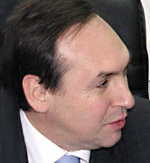A round-table discussion was organized on March 22 with the initiative of the “Unity for Russia” fund and “Russia’s strategy” journal. The theme was interesting: “Parliamentary and Presidential elections in Armenia and Russia’s interests”.
Head of the interregional and cultural issues department of the Russian president’s administration Modest Kolerov was also present during the discussion. He expressed his concerns regarding the increase of foreign influence in Armenia and having that lead up to the election of Vardan Oskanyan as president instead of Serge Sargsyan. Kolerov characterized that turn of events as nothing more, nothing less as a “color revolution”. The main debaters of the round-table discussion were president of the “Politika” Fund Vyacheslav Nikonov and politician Andranik Mihranyan. I think that readers would be more interested in Nikonov’s speech. The latter believes that it is wrong not to have the upcoming parliamentary elections to be held on May 12 in the center of attention of Russia because after all, the results of those elections are of great significance for Russia. The politician underlined that Armenia is the only country in the South Caucasus that is not part of GUAM and is the most promising partner for Russia; also, he stated that there have never been anti-Russian moods in Armenia.
“By securing its bases in Georgia and strengthening its positions in Azerbaijan, the U.S. is becoming a significant factor in the political field of Armenia,” said Nikonov and added that the viewpoints of the U.S. and Russia differ in many aspects. “Whereas Moscow considers it a success to create a zone of countries that have good ties with Russia and want to strengthen ties with that country, the West is aimed at weakening the influence of Russia”. Nikonov stresses that the region is a difficult region full of dangers of the restart of conflicts and the securing of stability is one of the supremacies of Russian foreign policy. This is where the discussion gets interesting.
“In Russia’s complicated situation that is gaining momentum, it is very important for Russia to see such political forces come to power in the South Caucasus that are ready for constructive co-operation with Russia. It is dangerous to simply think that those forces will automatically come out victorious. Everything is not that simple in the Armenian political field,” said Nikonov.
The latter considers Robert Kocharyan as a “sincere partisan of positive relations with Russia” and reminds that Kocharyan can not run for president for the third time. Not mentioning which surveys, the debater said that based on the results of those surveys, “average citizens and the elite of Armenia consider Serge Sargsyan as the successor of Robert Kocharyan”.
“Sargsyan is also beneficial for Russia. Being the strong yet flexible political activist that he is, he has already established firm ties with the Russian authorities,” said Nikonov. The latter noted that based on surveys of public opinion, 21% of voters are ready to cast their votes for the Republican Party. The Russian politician considers “Prosperous Armenia” as the “storage political party of the government that simply got off on the right foot”. As for leader of “Prosperous Armenia” Gagik Tsarukyan, according to Nikonov, “it is hard to picture him as president of Armenia; besides that, it seems as though he doesn’t have such ambitions”.
Nikonov is certain that only three to four oppositional political parties can exceed the 5% limit. According to the Russian politician, pro-Western Arthur Baghdasaryan (whose party is favored by 8% of voters) can have inclinations for becoming the “Armenian Yushchenko”. As of now, Artashes Geghamyan’s “National Unity” party has 7% of the vote, while Stepan Demirchyan’s Armenian Popular Party has 3%. Nikonov says that the Armenian Revolutionary Federation has 6% of the vote thanks to its devoted voters. The debater believes that it is too early to jump to conclusions because the pre-electoral campaign is still ahead.
“I must say that the problems of governmental political parties in Yerevan, no matter how strange it sounds, are linked to their positions on intimate ties with Russia”. According to Nikonov, there are no anti-Russian moods in Armenia; there are simply disappointments in the co-operation between the two countries.
“The main issue of Russia is to help the current government get rid of that disappointment,” said Nikonov and asked how Russia can help Armenia. He answered his own question: first, Russia has to be careful with Armenia, protect the interests of Armenians living and working in Russia, condemn the crimes on ethnic grounds, enforce the past transactions made to Russia in exchange for debt, etc. “If all of this is done, we will help the pro-Russian forces of Armenia and thus, we will help ourselves.” This sentence said by Kolerov says it all.
If another Armenian politician instead of Andranik Mihranyan was sitting next to him during the round-table discussion, perhaps he would have asked why Russia remembered the murders of Armenians and the stolen factories before the elections, or he would say that the Armenian people must first of all take into consideration their interests and not the interests of Russia, as stated in the theme of the discussion. But Andranik Mihranyan was the one present…
In closing, Nikonov concluded by saying: “Let’s not forget about the power of speech. Not a lot depends on the word of Russia and Armenia is not against that yet.”. We can add “the word of the big brother”. Who knows? Perhaps Mihranyan added that.

